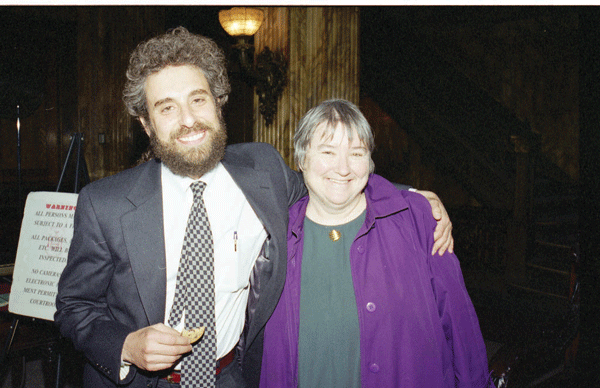
BY SARAH FERGUSON | He’s defended everyone from Lower East Side squatters and the homeless denizens of Tompkins Square Park to the leaders of Hamas and most recently Osama bin Laden’s son-in-law.
Now friends and supporters of radical attorney Stanley Cohen are coming to his defense in the wake of Cohen’s decision to plead guilty to felony charges of “impeding” the Internal Revenue Service by failing to file taxes from 2005 to 2010 and failing to report more than $35,000 in cash payments from clients.
On April 14, Cohen appeared in U.S. District Court in Syracuse, N.Y., to accept a plea deal, which could land him in jail for 18 months and cost him his law license. He will plead guilty to similar charges of tax “obstruction” in Manhattan District Court on May 1. He expects to be sentenced in October.
This week Cohen’s supporters launched an online petition drive via the Web site change.org to ask that the sentencing judge show leniency and “reduce the jail sentence to zero in light of Cohen’s many years of public service.” (The petition’s address is chn.ge/1iqAlKM .)
The year-and-a-half prison term is part of the plea deal. But the judge can use his discretion to reduce the sentence “in the interest of justice,” said Jay Liederman, a California criminal defense attorney who worked alongside Cohen to defend hacktivists charged in the so-called PayPal 14 case.
Liederman concedes “it’s a rare day” when judges depart from the terms agreed to under a plea deal, “but then this is a rare case.”
“There’s not many people on this earth who have put in the kind of work and pro bono service that Stanley has on behalf of his fellow man, so we’re hoping the court will recognize that,” Liederman said.
At the same time, Liederman and other members of the newly formed Stanley Cohen Defense Commitee have launched a fundrising drive on rally.org to help pay off Cohen’s extensive legal bills, as well as the likely cost of restoring his law license once any jail term is served. (The fundraising drive’s address is ral.ly/t/1591822 .)
They are also hoping to finance a speaking tour for Cohen so he can address what he and his supporters view as a concerted effort by the federal government to “silence” him for his radical views and his work on behalf of politically unpopular clients.
A day before he took the guilty plea, Cohen issued a defiant statement via his Web site, istanleycohen.org, and Twitter. He accused prosecutors of engaging in a political “witch hunt,” starting a decade ago, when Department of Justice officials accused him of providing “material support” for terrorism as a result of his work for groups such as Hamas.
While those charges were thrown out, for the past seven years, the I.R.S. has been investigating him along with his clients and family members. In 2009, federal officials raided his East Village apartment and law office on Avenue D and his home in Jeffersonville, N.Y., near the Akwesasne Reservation, seizing bank accounts along with a safety deposit box in which prosecutors claim they found thousands of dollars of marijuana-scented cash.
In a press statement, prosecutors accused Cohen of failing to report more than $3.6 million in deposits to his accounts, including some $643,000 in cash deposits wired from a convenience store next to the Akwesasne Reservation.
“Stanley Cohen sought to avoid his tax obligations by consistently failing to file his federal and state tax returns over a six-year period and by operating his law practice in a manner that corruptly hid millions of dollars in legal fees from the Internal Revenue Service,” charged U.S. Attorney Richard Hartunian. “No citizen, especially an attorney, is above the law.”
Cohen concedes he didn’t file taxes for many years but says he filed extensions and made partial payments. The $3.6 million in deposits cited by the feds do not take into account more than $2.6 million in expenses, he maintains.
But the years of legal threats have taken their toll on him and his family, and cost more than $600,000 in legal fees thus far.
Facing trials in two separate districts, hundreds of thousands dollars more in legal fees, and the prospect of up to 20 years in jail were he convicted, Cohen said he opted to take a plea.
While he will likely lose his law license of 31 years, Cohen expressed confidence in his statement that he will be able to restore his license after serving his sentence. He said he would make use of his jail time by assisting the “unjustly accused” and writing his memoirs.

































